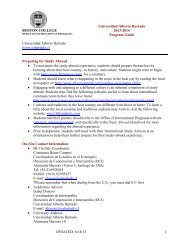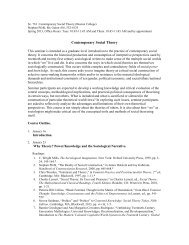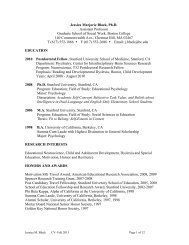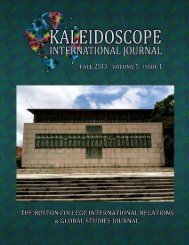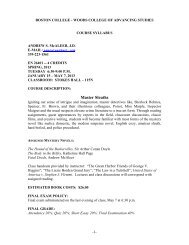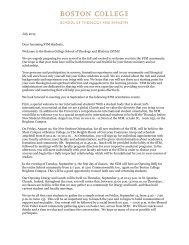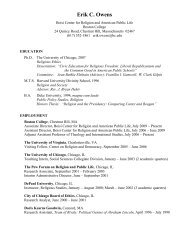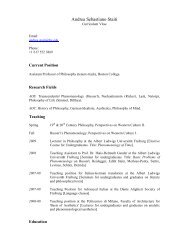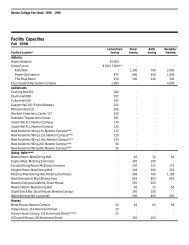separation of powers in thought and practice? - Boston College
separation of powers in thought and practice? - Boston College
separation of powers in thought and practice? - Boston College
Create successful ePaper yourself
Turn your PDF publications into a flip-book with our unique Google optimized e-Paper software.
2013] Separation <strong>of</strong> Powers <strong>in</strong> Thought <strong>and</strong> Practice? 455<br />
acknowledged the po<strong>in</strong>t as it applies to the <strong>separation</strong> <strong>of</strong> <strong>powers</strong>: we<br />
still say that, on this at least, he must have provided arguments.<br />
I fear that Montesquieu’s failure to spell out the arguments <strong>in</strong>fected<br />
James Madison as well. When Madison was try<strong>in</strong>g to establish that<br />
Montesquieu argued for a limited rather than a complete <strong>separation</strong> <strong>of</strong><br />
<strong>powers</strong>, he referred to Montesquieu’s reasons for the pr<strong>in</strong>ciple:<br />
The reasons on which Montesquieu grounds his maxim are a<br />
further demonstration <strong>of</strong> his mean<strong>in</strong>g. “When the legislative<br />
<strong>and</strong> executive <strong>powers</strong> are united <strong>in</strong> the same person or body”<br />
says he, “there can be no liberty, because apprehensions may<br />
arise lest the same monarch or senate should enact tyrannical<br />
laws, to execute them <strong>in</strong> a tyrannical manner.” Aga<strong>in</strong>: “Were the<br />
power <strong>of</strong> judg<strong>in</strong>g jo<strong>in</strong>ed with the legislative, the life <strong>and</strong> liberty<br />
<strong>of</strong> the subject would be exposed to arbitrary control, for the<br />
judge would then be the legislator. Were it jo<strong>in</strong>ed to the executive<br />
power, the judge might behave with all the violence <strong>of</strong> an<br />
oppressor.” Some <strong>of</strong> these reasons are more fully expla<strong>in</strong>ed <strong>in</strong><br />
other passages; but briefly stated as they are here they sufficiently<br />
establish the mean<strong>in</strong>g which we have put on this celebrated<br />
maxim <strong>of</strong> this celebrated author.84<br />
Madison does not tell us, however, where these other passages are<br />
(where Montesquieu’s reasons are supposedly spelled out more explicitly)<br />
or what they say. And he himself just falls <strong>in</strong> with Montesquieu’s<br />
<strong>practice</strong> <strong>of</strong> abbreviated argumentation, with the bare assertion that<br />
“[t]he accumulation <strong>of</strong> all <strong>powers</strong>, legislative, executive, <strong>and</strong> judiciary,<br />
<strong>in</strong> the same h<strong>and</strong>s, whether <strong>of</strong> one, a few, or many, <strong>and</strong> whether hereditary,<br />
self-appo<strong>in</strong>ted, or elective, may justly be pronounced the very def<strong>in</strong>ition<br />
<strong>of</strong> tyranny.”85 He adds that “it will be proper to <strong>in</strong>vestigate the<br />
sense <strong>in</strong> which the preservation <strong>of</strong> liberty requires that the three great<br />
departments <strong>of</strong> power should be separate <strong>and</strong> dist<strong>in</strong>ct,” but that turns<br />
out to be just an <strong>in</strong>vestigation <strong>of</strong> the extent <strong>of</strong> desirable <strong>separation</strong>, not<br />
an account <strong>of</strong> the connection with liberty.86<br />
I suspect, too, that this is why we tend to blur the dist<strong>in</strong>ction between<br />
the various pr<strong>in</strong>ciples I described <strong>in</strong> Part II <strong>of</strong> this Essay— particularly<br />
the dist<strong>in</strong>ction between Separation <strong>of</strong> Powers, on the one h<strong>and</strong>,<br />
<strong>and</strong> the Division <strong>of</strong> Power <strong>and</strong> Checks <strong>and</strong> Balances Pr<strong>in</strong>ciples on the<br />
84 The Federalist No. 47, supra note 16, at 241.<br />
85 Id. at 239.<br />
86 See id.



